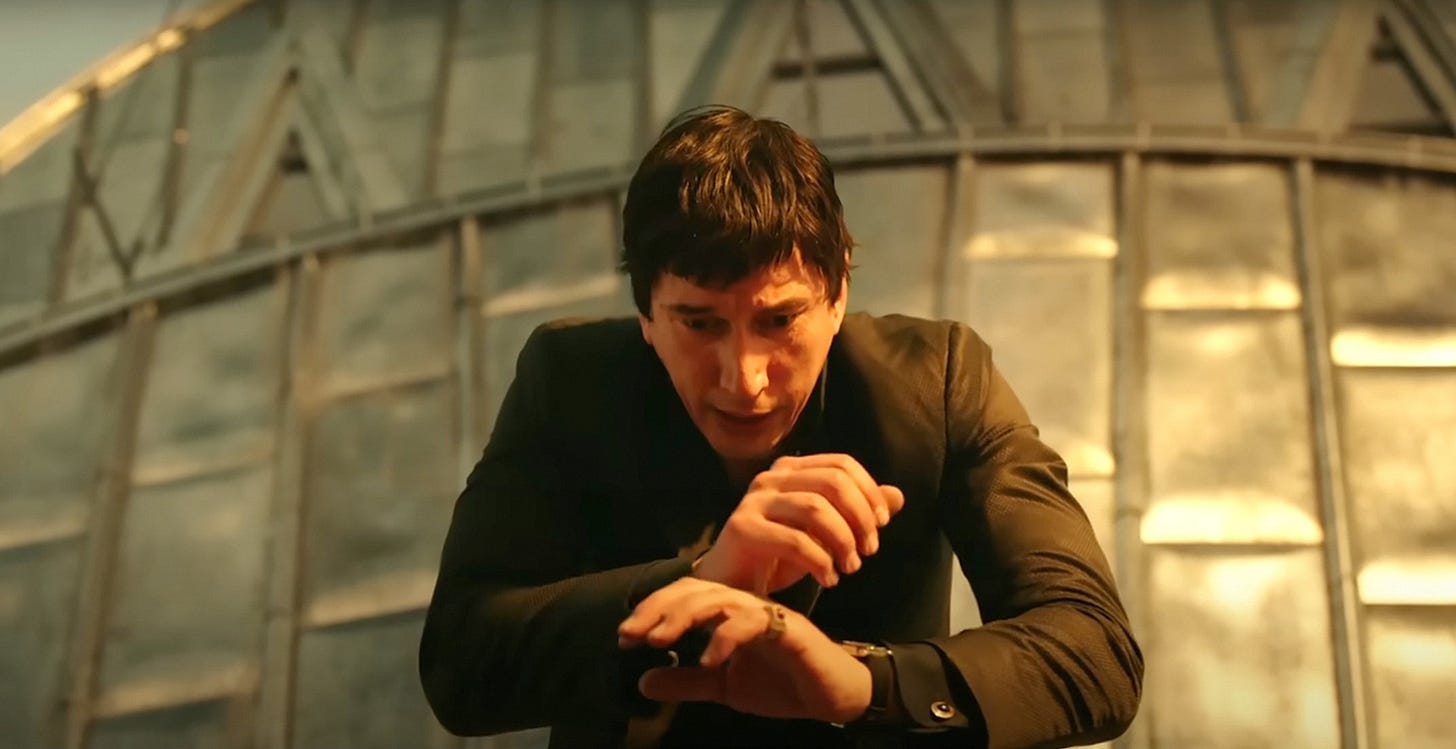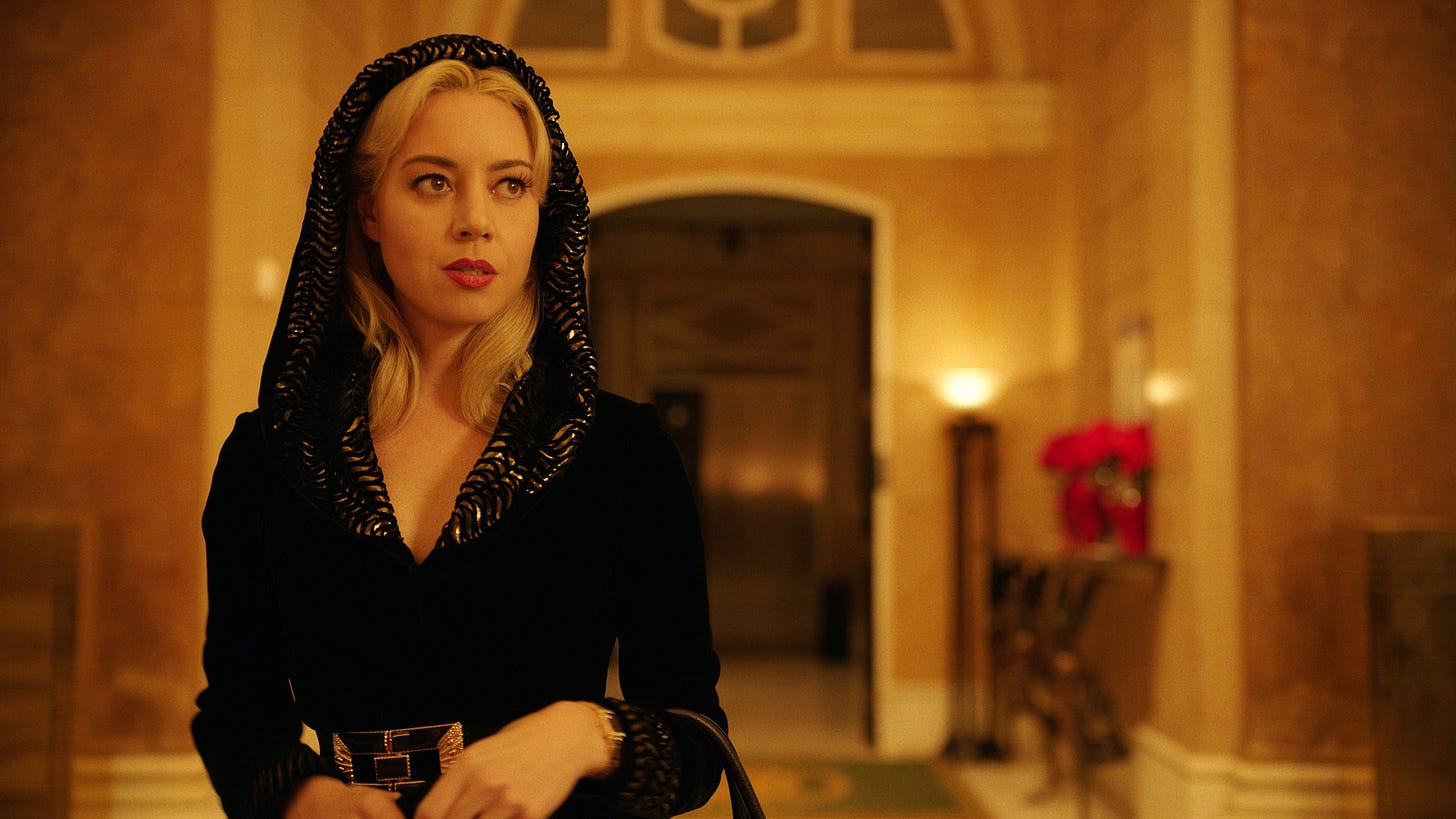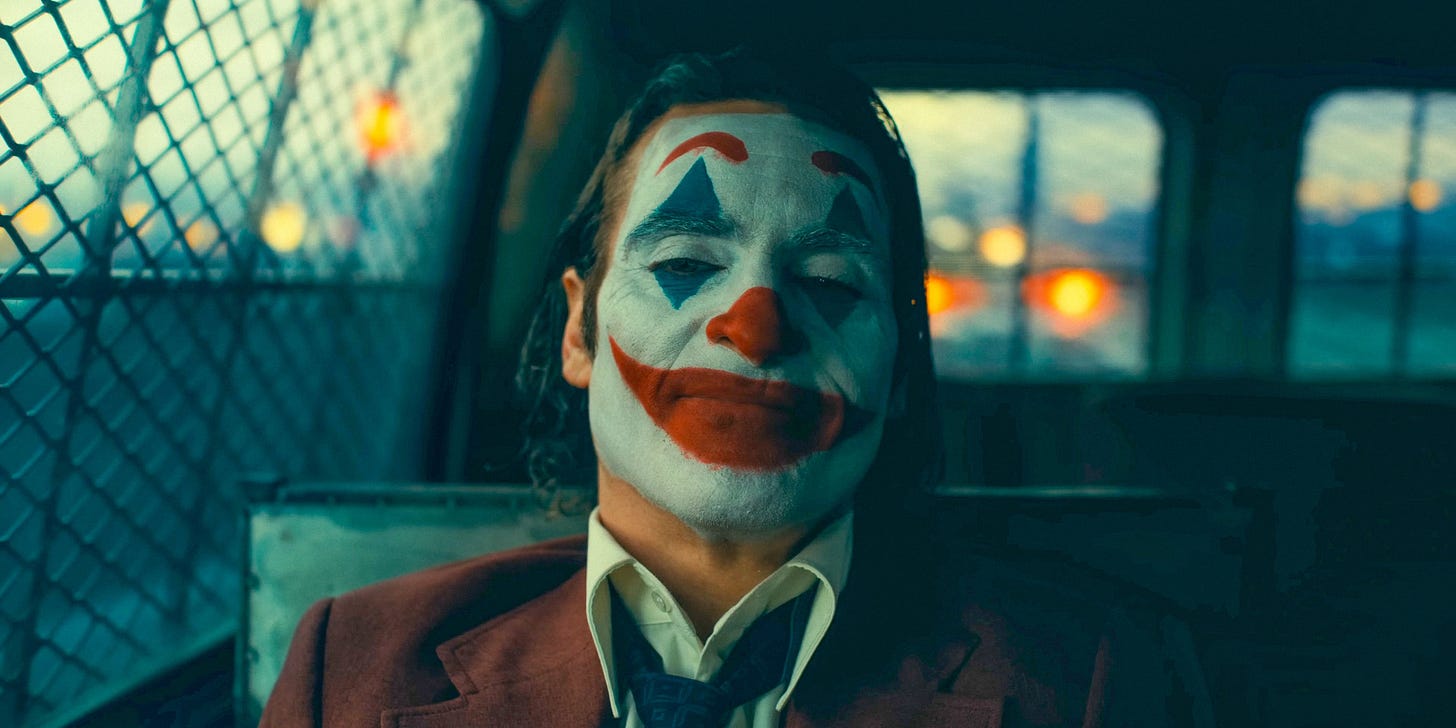I’m glad it’s a week later, so I don’t need to go into all the praise for Francis Ford Coppola as a great filmmaker and great man. I don’t need to talk about how “Megalopolis” was planned since before I was alive, or how it was financed, or how it died a totally-predictable-in-every-way death at the box office. And I definitely don’t need to flaunt my knowledge of late-career films by culturally-significant auteurs. I’m relieved I can shed all these concerns and merely tell you that “Megalopolis” is stupid.
I have my feelings about the entire endeavor overall, a ludicrous tale of a supercool young architect who has a magic substance to help him build a future society and condescend to everyone who isn’t with his gold sideways escalators that supposedly represent innovation or progress or something. But there’s one element I’m surprised to see no one engage with in reviews: the idea that this is a film about men discussing how to build an idyllic civilization. Not only have critics not engaged with the question itself between characters (which, admittedly, is a train of thought the movie only pursues through glib quotations and mock-profundity), but they’ve ignored the query as presented to themselves. It’s Big Picture stuff, and it’s not hard to see why Coppola was so obsessed with the thought for decades, despite the feeble intellectual pursuit that powers the film’s actual narrative.
It’s interesting that Adam Driver’s Cesar, is trying to contrast the last civilization with the new one, and not once does the idea of law enforcement come up. You’re building a new city, and I haven’t heard any plans for prisons. So what is this city’s view on justice? Not once does the movie broach the issue of whether or not this new city will house prisoners of any kind. This would be exciting if the movie had any thoughts on crime and punishment. How about restorative justice? Can we entertain the notion?
It’s a particularly galling note considering Cesar’s main opponent is Cicero (Giancarlo Esposito), a former D.A. crooked enough to attempt to prosecute an innocent Cesar for murder, and who now is seen by the public as corrupt for reasons not entirely important to the narrative, and as such not remotely clear. Is this a comment on a move away from overzealous prosecution? It would be, were Cesar actually interested in the plight of the incarcerated. In such a Megalopolis, how will crime be regulated? Or are we to assume that, ideologically, crime will simply evaporate? Does it have anything to do with the gold sideways escalators?
To be fair, absence of prison talk didn’t stand out to me as much as the refusal to engage with religion. If you’re building a new society, you’ll have to engage with people who have thoughts on this topic. I’m not necessarily religious, but the way in which Hollywood films have surgically removed all elements on religion (to say nothing of actual theology) simply doesn’t ring true in today’s America. Even if you work in a city or urban environment that someone like Ted Cruz would convince you is filled with godless heathens, you’ll be around people who pray daily, who are respectful towards a higher power, and probably wear some sort of religious paraphernalia. And that’s among the working class. Once you get to the level of multimillionaire like many of the characters in this movie, you’ll know that the deepest pockets roll with some version of a god.
It’s disingenuous when most modern filmmakers pretend to be this oblivious. But Francis Ford Coppola is a man out of time. Most of the visual cues from “Megalopolis” feel borrowed from silent film, like the gaudy effect of Cesar multiplying as the magical megalon rebuilds his decimated face. This is also a movie where newspaper headlines are the ones to break major stories, and no one is ever online. Considering this is a movie about building a new society today, this is Coppola letting us know he doesn’t actually communicate with anyone who practices religion, and he has no unpleasant interactions with law enforcement. It would be cruel to call Coppola a snob for this, when it reflects his own extravagant life choices. No, it’s a reflection of the fact that the man who made “Apocalypse Now” just isn’t a serious person anymore. Unfortunately he spent millions of his own dollars and two and a half hours of your time to tell you that.
Oddly enough, another controversial new film, “Joker: Folie a Deux”, presents certain thoughts on incarceration. Unlike it’s predecessor, it’s actually sort of a prison film, following the first movie’s tortured Arthur Fleck in captivity following several murders. This is meant to be the fabled Arkham Asylum of Gotham City lore, but it’s shown to be just another grimy 80’s-era hole in which prisoners are discarded. Though the officers show disdain towards Arthur, he is largely given preferential treatment given that he’s the subject of a movie (which we never see: in addition to what we know director Todd Phillips isn’t interested in, we now know he’s not even enough of a cinephile to mock-up what an in-universe depiction of the Joker’s actions would look like cinematically).
Fleck is eventually taken to trial, which ends up with him firing his lawyer and going pro se. None of this is dramatically compelling — imagine if forty minutes of “The Dark Knight” involved people in a courtroom describing the events of “Batman Begins”. What happens once Fleck gives the under-utilized Catherine Keener an exit from the movie doesn’t at all work from a storytelling perspective, but it’s a similar result to when the accused decide to move forward pro se — they are overwhelmed and outmanned and, one way or another, they simply incriminate themselves. Everyone is free to go pro se and defend themselves in court, with legal assistance available at a moment’s need, and it isn’t a way to endear yourself to the judge. Hopefully you get a judge like Joker does in this movie, because he allows every single piece of gibberish Joaquin Phoenix’s improvisational method acting could conjure. Judge, permission to don clown makeup, do a standup routine and adopt a phony Southern accent? Wait, you’ll allow it?
“Folie a Deux”, the type of movie a director makes either reluctantly for a big paycheck and/or to avoid the gun to his head, doesn’t work on any particular level. The fantasy sequences, the shared delusion of the film’s subtitle, also look drab and cut-rate, only showcasing that in the fantasies of lovers Arthur and Harleen, she vamps and sings like the supernatural Lady Gaga, whereas he still can’t carry a tune. And the reality is that this is a world that keeps taking advantage of Arthur, whether or not he finally cops to his own toxic narcissism (and his malingering psychological condition, an actual result of many pro se cases but a distressing superstition to pay off). Like in the first film, the emotions at play (against a cruel world filled with Wall Street bros singing showtunes) are somewhat inarticulate — unlike that first troubling feature, they’re also at a low boil, because literally and figuratively there’s nowhere for the Joker to go. In the first film, he could break out and be the Joker when he pleased. In this film, he’s almost exclusively the Joker in interminable fantasy sequences. He is otherwise merely Arthur, the world’s most self-pitying punching bag.
The depiction of “prison” is, of course, brutal — this is still the 80’s, the implication that institutional oversight is still decades away. But few of the other inmates are given much to say, except when they inexplicably know all the words to “Oh When The Saints Go Marching In”. Despite an invite to a music therapy class (which we know nothing about), the place is dingy and depressing but not-at-all lived-in. As Arthur makes his way back and forth to the court, each return to the Asylum treats him worse and worse. By the film’s end, the movie/franchise reaches for a punchline of sorts by showing that the prison makes others mad too. Mad enough to act like they’re not in a movie, but instead in a bonus episode of “Gotham”. Psychological verisimilitude, isn’t a part of this Arkham.
In describing how these films fail to focus on the issue of incarceration, my observations are superficially narrow. However, I would say the lack of insight towards prisons is telling as far as the focus of filmmakers both modern and, well, ancient. The desire to avoid concerns about this issue is a sign that both of these movies have ideologically hollow centers, free of concern from any serious topics beyond the abstract. As far as Coppola, perhaps some could say he’s lost awareness of these topics. For Todd Phillips, you could make a case the guy cares little to address any semblance of reality within the framework of a story that sabotages a valuable piece of corporate IP for edgelord reasons. Both movies ask the question of what kind of world would you like to inhabit, “Megalopolis” explicitly, and “Joker 2” metaphorically (Gotham 1980’s being an obvious corollary to other places/time periods). Neither seems interested, and both seem downright scared, to actually answer that.









Saying that Joker is better than Megalopolis is not saying much, but yeah, CInemaScore got this one wrong :)
Re: Megalopolis. I don't think there was any plan for prisons. The images of Cesar's improved New Rome barely seemed to house any residences, certainly not enough for all the people made homeless by Cesar's illegal building implosions.
I don't think it's intentional but Megalopolis does kind of work as a polar opposite to Escape From New York. Instead of a dysfunctional city becoming one big prison it becomes a gated community with the masses pushed into suburban slums or simply driven away. Thanks for the great review!